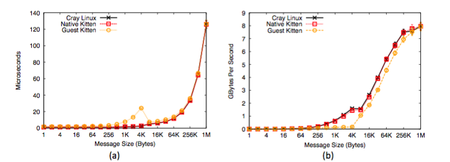One of the challenges in designing, developing, and deploying a research operating system (OS) for high- performance computing platforms has been the integration of device drivers for peripheral hardware, such as disk drives and network adapters. Developing and maintaining a device driver, which essentially allows the operating system to make use of the attached hardware, can be a tedious and time- consuming activity. Since nearly all vendors provide Linux device drivers for their hardware, it would be ideal if research OSs could simply use these existing drivers. Recently Sandia researchers along with collaborators from the University of Pittsburgh have successfully employed a multi-kernel approach that eliminates the need for a custom OS to have a custom device driver. The Kitten Lightweight Kernel OS was ported to the Cray XC architecture by extending the Cray Linux Environment to partition a node’s resources to be able to run Kitten alongside Linux. To enable applications running on Kitten to use Cray’s Aries interconnect, an approach was developed that passes control plane operations from Kitten to the Aries device driver running on Linux. Data plane transmissions flow directly from Kitten application memory to the Aries, enabling near-native MPI networking performance. Performance tuning is underway to try to optimize remaining performance differences.
